Boyle J.A. The Cambridge History of Iran, Volume 5: The Saljuq and Mongol Periods
Подождите немного. Документ загружается.

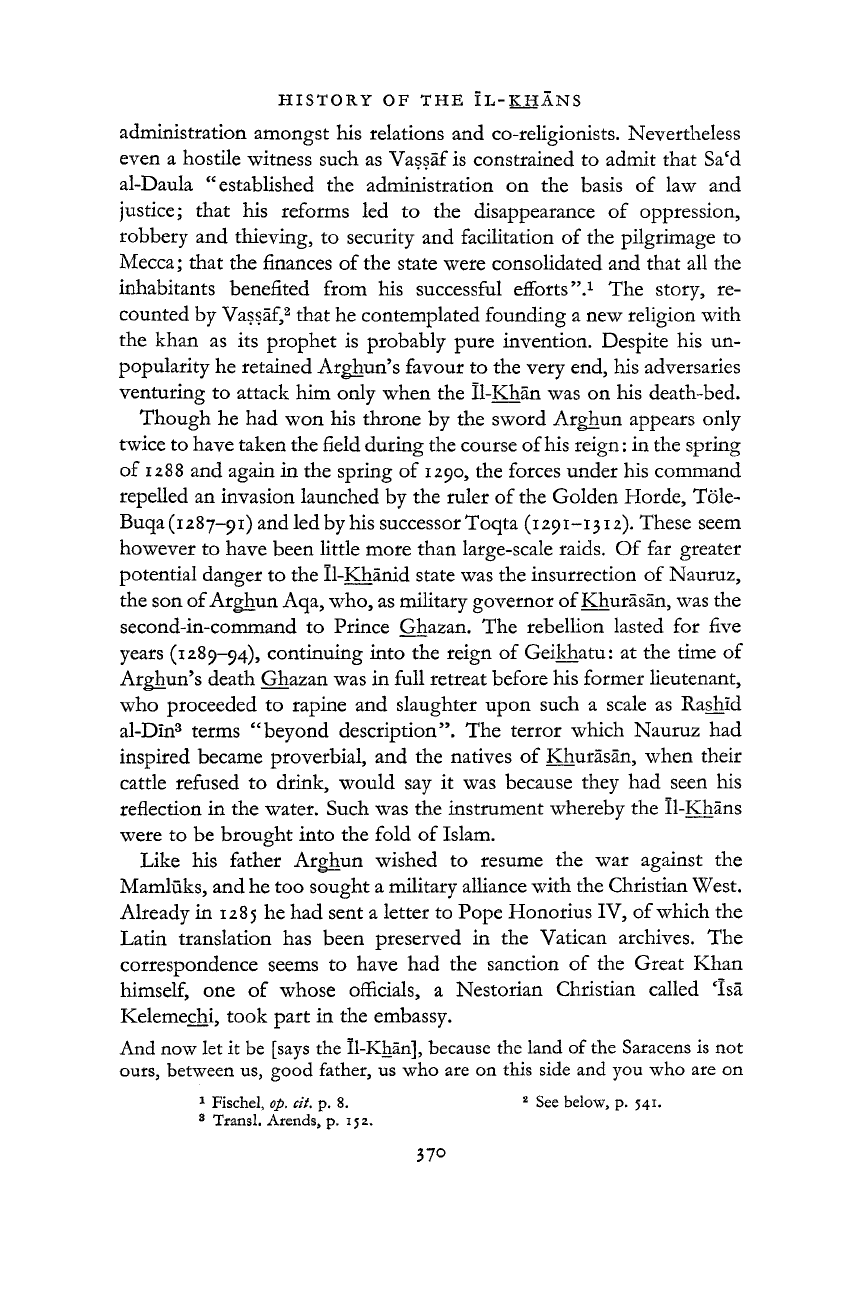
HISTORY OF THE IL-KHANS
370
administration amongst his relations and co-religionists. Nevertheless
even a hostile witness such as Vassaf is constrained to admit that Sa'd
al-Daula "established the administration on the basis of law and
justice;
that his reforms led to the disappearance of oppression,
robbery and thieving, to security and facilitation of the pilgrimage to
Mecca; that the finances of the state were consolidated and that all the
inhabitants benefited from his successful efforts".
1
The story, re-
counted by
Vassaf,
2
that he contemplated founding a new religion with
the khan as its prophet is probably pure invention. Despite his un-
popularity he retained Arghun's favour to the very end, his adversaries
venturing to attack him only when the Il-Khan was on his death-bed.
Though he had won his throne by the sword Arghun appears only
twice to have taken the field during the course of his reign: in the spring
of
1288
and again in the spring of
1290,
the forces under his command
repelled an invasion launched by the ruler of the Golden Horde, Tole-
Buqa(i287֊9i)
and led by his successor Toqta
(1291-1312).
These seem
however to have been little more than large-scale raids. Of far greater
potential danger to the Il-Khanid state was the insurrection of Nauruz,
the son of Arghun Aqa, who, as military governor of Khurasan, was the
second-in-command to Prince Ghazan. The rebellion lasted for five
years (1289-94), continuing into the reign of Geikhatu: at the time of
Arghun's death Ghazan was in full retreat before his former lieutenant,
who proceeded to rapine and slaughter upon such a scale as Rashid
al-Din
3
terms "beyond description". The terror which Nauruz had
inspired became proverbial, and the natives of Khurasan, when their
cattle refused to drink, would say it was because they had seen his
reflection in the water. Such was the instrument whereby the Il-Khans
were to be brought into the fold of Islam.
Like his father Arghun wished to resume the war against the
Mamluks, and he too sought a military alliance with the Christian West.
Already in
1285
he had sent a letter to Pope Honorius IV, of which the
Latin translation has been preserved in the Vatican archives. The
correspondence seems to have had the sanction of the Great Khan
himself, one of whose officials, a Nestorian Christian called 'Isa
Kelemechi, took part in the embassy.
And now let it be [says the Il-Khan], because the land of the Saracens is not
ours, between us, good father, us who are on this side and you who are on
1
Fischel, op. cit. p. 8.
2
See below, p. 541.
3
Transl. Arends, p. 152.
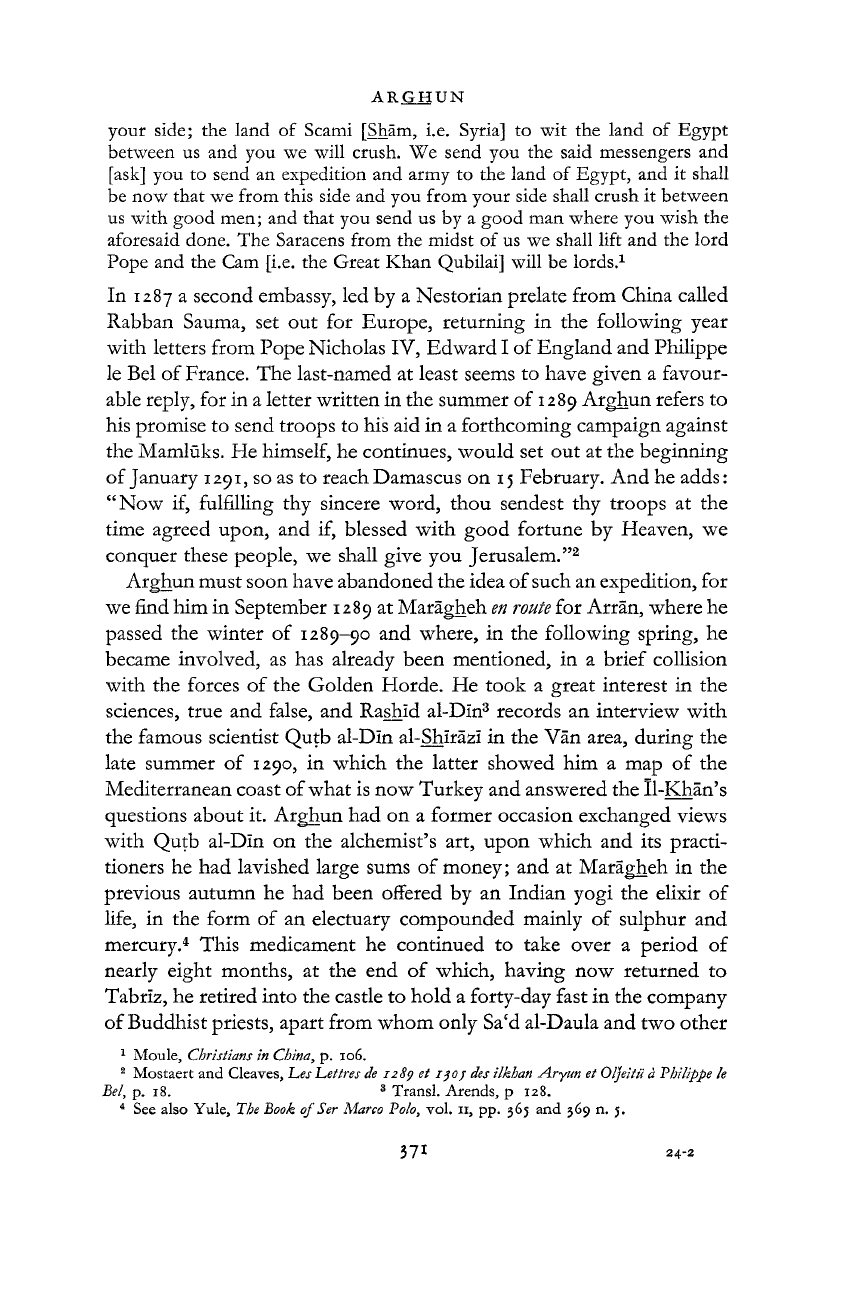
ARGHUN
371
24-2
your side; the land of Scami [Sham, i.e. Syria] to wit the land of Egypt
between us and you we will crush. We send you the said messengers and
[ask] you to send an expedition and army to the land of Egypt, and it shall
be now that we from this side and you from your side shall crush it between
us with good men; and that you send us by a good man where you wish the
aforesaid done. The Saracens from the midst of us we shall lift and the lord
Pope and the Cam [i.e. the Great Khan Qubilai] will be lords.
1
In
1287
a second embassy, led by a Nestorian prelate from China called
Rabban Sauma, set out for Europe, returning in the following year
with letters from Pope Nicholas IV, Edward I of England and Philippe
le Bel of France. The last-named at least seems to have given a favour-
able reply, for in a letter written in the summer of
1289
Arghun refers to
his promise to send troops to his aid in a forthcoming campaign against
the Mamluks. He himself, he continues, would set out at the beginning
of January
1291,
so as to reach Damascus on
15
February. And he adds:
"Now if, fulfilling thy sincere word, thou sendest thy troops at the
time agreed upon, and if, blessed with good fortune by Heaven, we
conquer these people, we shall give you Jerusalem."
2
Arghun must soon have abandoned the idea of such an expedition, for
we find him in September
1289
at Maragheh
en
route for Arran, where he
passed the winter of 1289-90 and where, in the following spring, he
became involved, as has already been mentioned, in a brief collision
with the forces of the Golden Horde. He took a great interest in the
sciences, true and false, and Rashid al-Din
3
records an interview with
the famous scientist Qutb al-Din al-Shirazi in the Van area, during the
late summer of
1290,
in which the latter showed him a map of the
Mediterranean coast of what is now Turkey and answered the Il-Khan's
questions about it. Arghun had on a former occasion exchanged views
with Qutb al-Din on the alchemist's art, upon which and its practi-
tioners he had lavished large sums of money; and at Maragheh in the
previous autumn he had been offered by an Indian yogi the elixir of
life,
in the form of an electuary compounded mainly of sulphur and
mercury.
4
This medicament he continued to take over a period of
nearly eight months, at the end of which, having now returned to
Tabriz,
he retired into the castle to hold a forty-day fast in the company
of Buddhist priests, apart from whom only Sa'd al-Daula and two other
1
Moule, Christians in China, p. 106.
2
Mostaert and
Cleaves,
Les Lettres de 1289 et
I$OJ
des
ilkhan Aryun et Oljeitii a Philippe le
Bel, p. 18.
8
Transl. Arends, p 128.
4
See also Yule, The Book of Ser Marco Polo, vol. 11, pp. 365 and 369 n. 5.
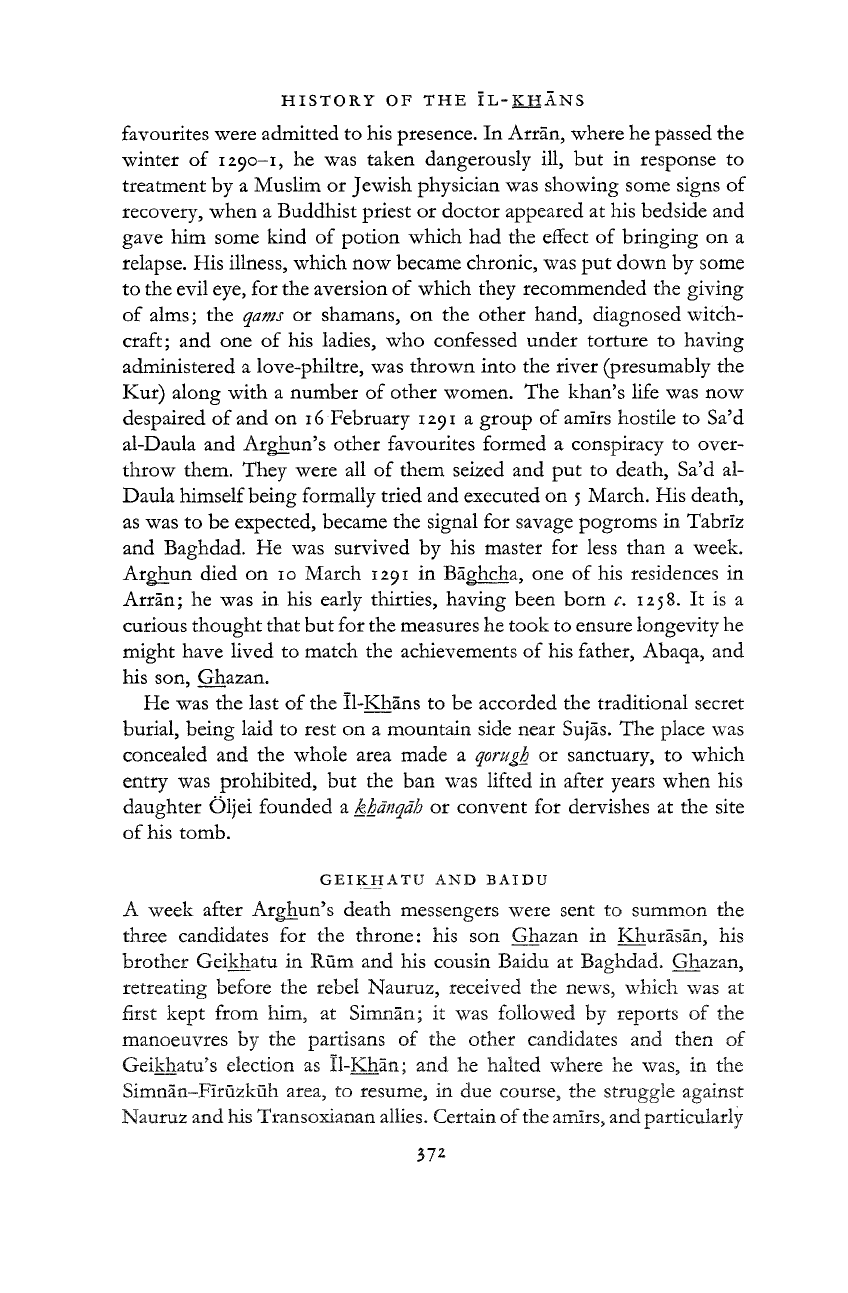
HISTORY OF THE IL-KHANS
372
favourites were admitted to his presence. In Arran, where he passed the
winter of
1290-1, he was taken dangerously ill, but in response to
treatment by a Muslim or Jewish physician was showing some signs of
recovery, when a Buddhist priest or doctor appeared at his bedside and
gave him some kind of potion which had the effect of bringing on a
relapse. His illness, which now became chronic, was put down by some
to the evil eye, for the aversion of which they recommended the giving
of alms; the qams or shamans, on the other hand, diagnosed witch-
craft; and one of his ladies, who confessed under torture to having
administered a love-philtre, was thrown into the river (presumably the
Kur) along with a number of other women. The khan's life was now
despaired of and on 16 February
1291
a group of amirs hostile to Sa'd
al-Daula and Arghun's other favourites formed a conspiracy to over-
throw them. They were all of them seized and put to death, Sa'd al-
Daula himself being formally tried and executed on 5 March. His death,
as was to be expected, became the signal for savage pogroms in Tabriz
and Baghdad. He was survived by his master for less than a week.
Arghun died on 10 March
1291
in Baghcha, one of his residences in
Arran; he was in his early thirties, having been born c.
1258.
It is a
curious thought that but for the measures he took to ensure longevity he
might have lived to match the achievements of his father, Abaqa, and
his son, Ghazan.
He was the last of the Il-Khans to be accorded the traditional secret
burial, being laid to rest on a mountain side near Sujas. The place was
concealed and the whole area made a qorugh or sanctuary, to which
entry was prohibited, but the ban was lifted in after years when his
daughter Oljei founded a khdnqdh or convent for dervishes at the site
of his tomb.
GEIKHATU AND
BAIDU
A week after Arghun's death messengers were sent to summon the
three candidates for the throne: his son Ghazan in Khurasan, his
brother Geikhatu in Rum and his cousin Baidu at Baghdad. Ghazan,
retreating before the rebel Nauruz, received the news, which was at
first
kept from him, at Simnan; it was followed by reports of the
manoeuvres by the partisans of the other candidates and then of
Geikhatu's election as Il-Khan; and he halted where he was, in the
Simnan-Firuzkuh area, to resume, in due course, the struggle against
Nauruz and his Transoxianan allies. Certain of the amirs, and particularly
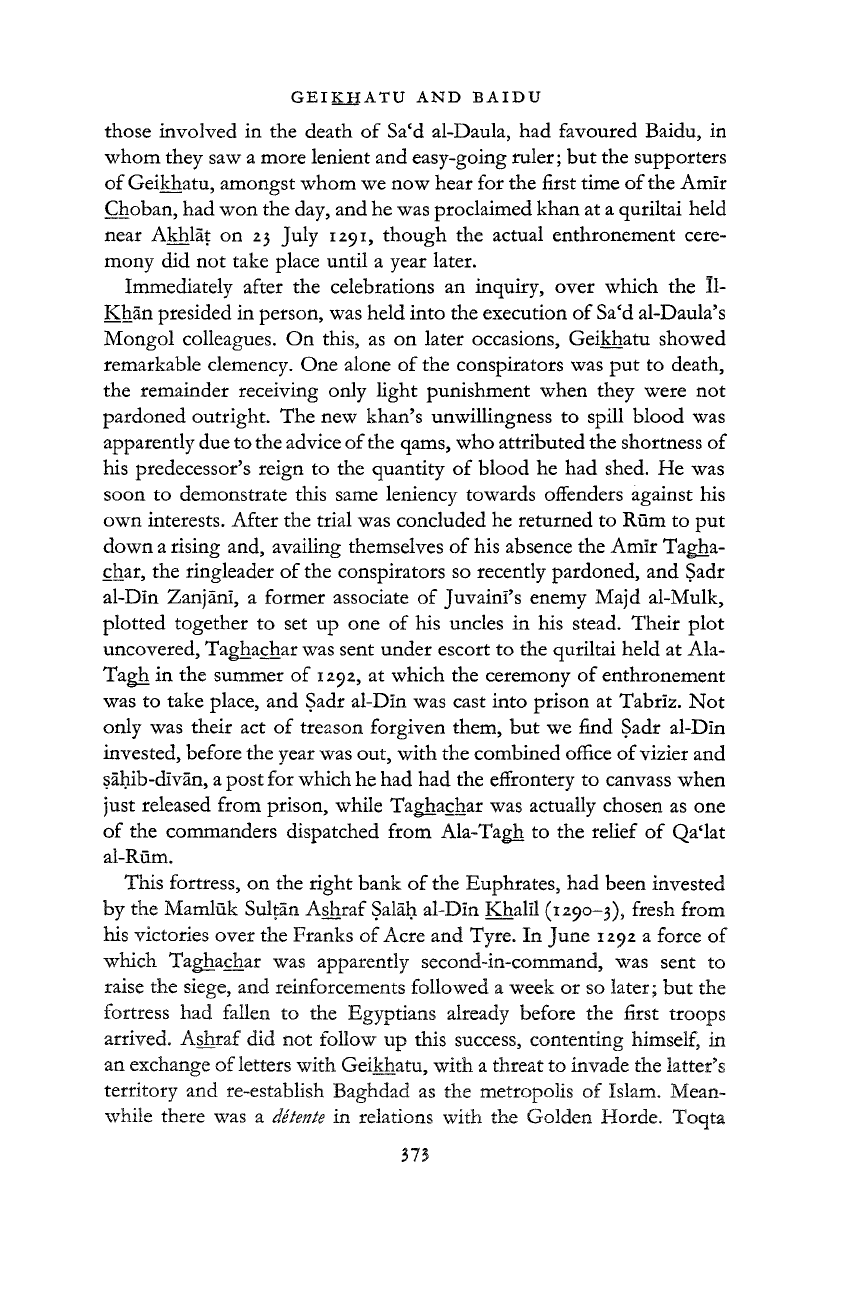
GEIKHATU AND BAIDU
373
those involved in the death of Sa'd al-Daula, had favoured Baidu, in
whom they saw a more lenient and easy-going ruler; but the supporters
of Geikhatu, amongst whom we now hear for the first time of the Amir
Choban, had won the day, and he was proclaimed khan at a quriltai held
near
Akhlät on 2$ July
1291,
though the actual enthronement cere-
mony did not take place until a year later.
Immediately after the celebrations an inquiry, over which the II-
Khän presided in person, was held into the execution of Sa
c
d al-Daula's
Mongol colleagues. On this, as on later occasions, Geikhatu showed
remarkable clemency. One alone of the conspirators was put to death,
the remainder receiving only light punishment when they were not
pardoned outright. The new khan's unwillingness to spill blood was
apparently due to the advice of the qams, who attributed the shortness of
his predecessor's reign to the quantity of blood he had shed. He was
soon to demonstrate this same leniency towards offenders against his
own interests. After the trial was concluded he returned to Rum to put
down a rising and, availing themselves of his absence the Amir Ta
gha-
char, the ringleader of the conspirators so recently pardoned, and Sadr
al-Din Zanjäni, a former associate of Juvaini's enemy Majd al-Mulk,
plotted together to set up one of his uncles in his stead. Their plot
uncovered, Taghachar was sent under escort to the quriltai held at Ala-
Tagh in the summer of
1292,
at which the ceremony of enthronement
was to take place, and Sadr al-Din was cast into prison at Tabriz. Not
only was their act of treason forgiven them, but we find Sadr al-Din
invested, before the year was out, with the combined office of vizier and
sähib-divän, a post for which he had had the effrontery to canvass when
just released from prison, while Taghachar was actually chosen as one
of the commanders dispatched from Ala-Tagh to the relief of Qa'lat
al-Rum.
This fortress, on the right bank of the Euphrates, had been invested
by the Mamluk Sultan Ashraf Saläh al-Din Khalil
(1290-3),
fresh from
his victories over the Franks of Acre and Tyre. In June
1292
a force of
which Taghachar was apparently second-in-command, was sent to
raise the siege, and reinforcements followed a week or so later; but the
fortress had fallen to the Egyptians already before the first troops
arrived. Ashraf did not follow up this success, contenting himself, in
an exchange of letters with Geikhatu, with a threat to invade the latter's
territory and re-establish Baghdad as the metropolis of Islam. Mean-
while there was a detente in relations with the Golden Horde. Toqta
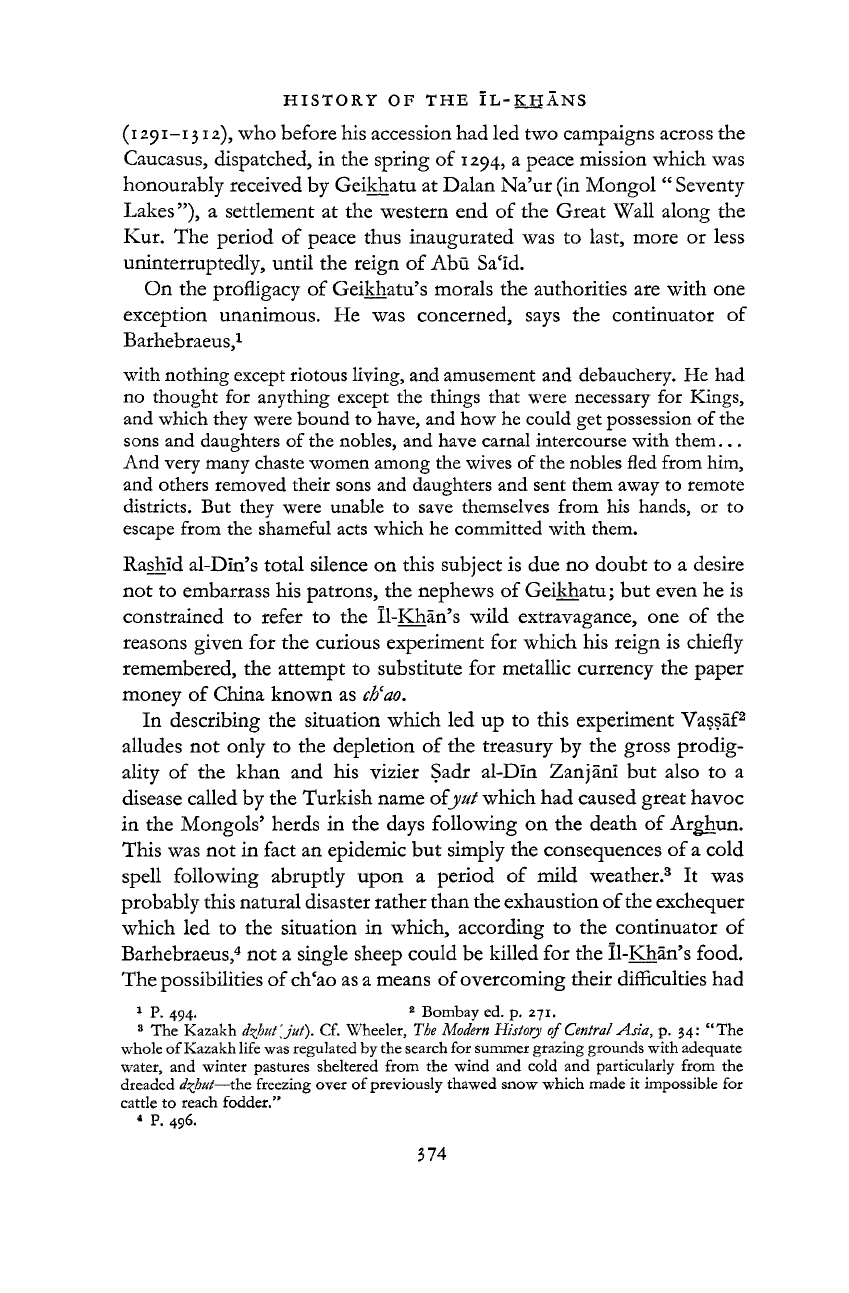
HISTORY OF THE ÎL-KHĂNS
374
(i 291-1312), who before his accession had led two campaigns across the
Caucasus, dispatched, in the spring of
1294,
a peace mission which was
honourably received by Geikhatu at Dalan Na'ur (in Mongol " Seventy
Lakes"),
a settlement at the western end of the Great Wall along the
Kur. The period of peace thus inaugurated was to last, more or less
uninterruptedly, until the reign of Abu Sa'id.
On the profligacy of Geikhatu's morals the authorities are with one
exception unanimous. He was concerned, says the continuator of
Barhebraeus,
1
with nothing except riotous living, and amusement and debauchery. He had
no thought for anything except the things that were necessary for Kings,
and which they were bound to have, and how he could get possession of the
sons and daughters of the nobles, and have carnal intercourse with them...
And very many chaste women among the wives of the nobles fled from him,
and others removed their sons and daughters and sent them away to remote
districts. But they were unable to save themselves from his hands, or to
escape from the shameful acts which he committed with them.
Raşhid al-Din's total silence on this subject is due no doubt to a desire
not to embarrass his patrons, the nephews of Geikhatu; but even he is
constrained to refer to the ll-Khan's wild extravagance, one of the
reasons given for the curious experiment for which his reign is chiefly
remembered, the attempt to substitute for metallic currency the paper
money of China known as
ch'ao.
In describing the situation which led up to this experiment Vaşşăf
2
alludes not only to the depletion of the treasury by the gross prodig-
ality of the khan and his vizier Şadr al-Din Zanjăni but also to a
disease called by the Turkish name of jut which had caused great havoc
in the Mongols' herds in the days following on the death of Ar
ghun.
This was not in fact an epidemic but simply the consequences of a cold
spell following abruptly upon a period of mild weather.
3
It was
probably this natural disaster rather than the exhaustion of the exchequer
which led to the situation in which, according to the continuator of
Barhebraeus,
4
not a single sheep could be killed for the Il-Khăn's food.
The possibilities of ch
c
ao as a means of overcoming their difficulties had
1
P. 494.
2
Bombay ed. p. 271.
3
The Kazakh d^hut'juf). Cf. Wheeler, The Modern History of Central Asia, p. 34: "The
whole of Kazakh life was regulated by the search for summer grazing grounds with adequate
water, and winter pastures sheltered from the wind and cold and particularly from the
dreaded d^hut—the freezing over of previously thawed snow which made it impossible for
cattle to reach fodder."
4
P. 496.
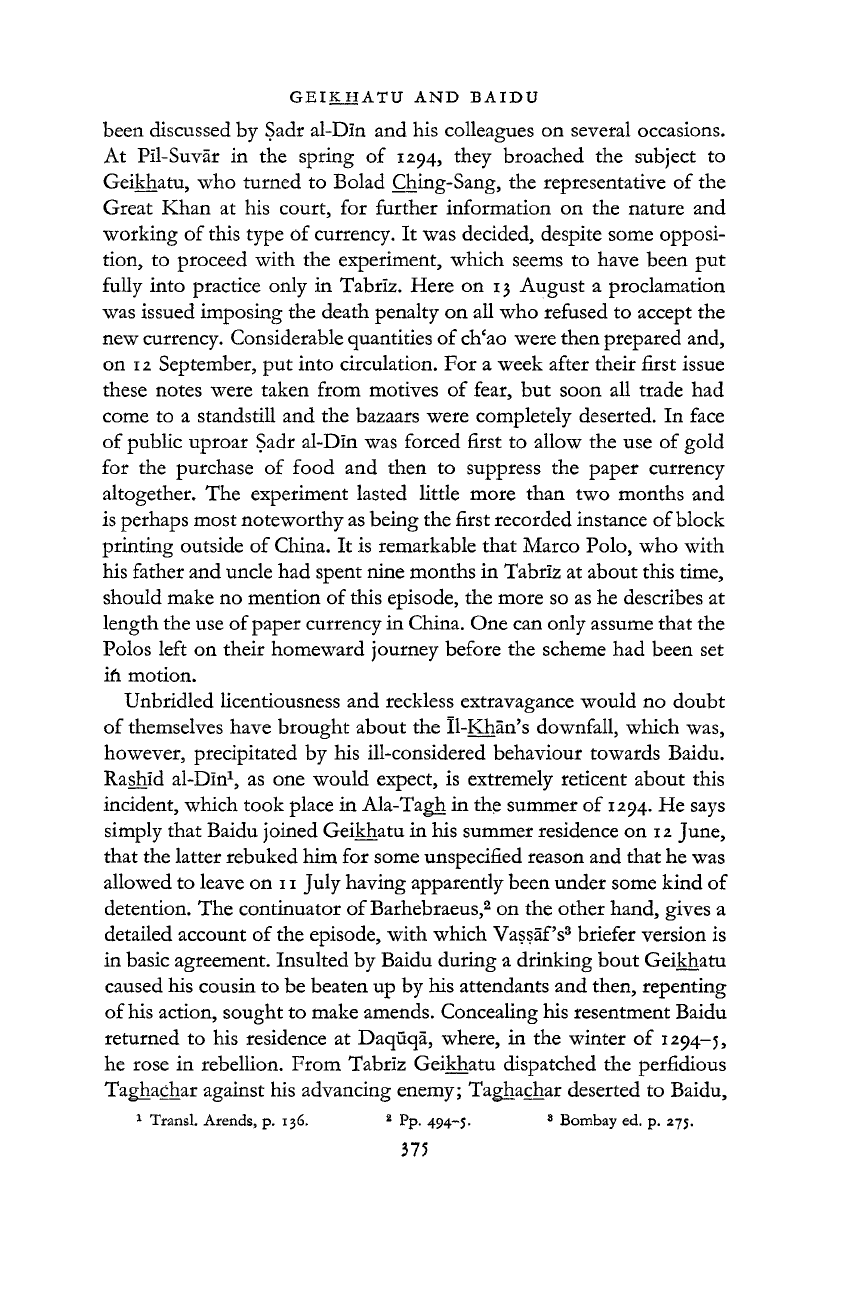
GEIKHATU AND BAIDU
375
been discussed by Şadr al-Din and his colleagues on several occasions.
At Pil-Suvăr in the spring of
1294,
they broached the subject to
Geikhatu, who turned to Bolad Ching-Sang, the representative of the
Great Khan at his court, for further information on the nature and
working of this type of currency. It was decided, despite some opposi-
tion, to proceed with the experiment, which seems to have been put
fully into practice only in Tabriz. Here on 13 August a proclamation
was issued imposing the death penalty on all who refused to accept the
new currency. Considerable quantities of ch'ao were then prepared and,
on 12 September, put into circulation. For a week after their first issue
these notes were taken from motives of fear, but soon all trade had
come to a standstill and the bazaars were completely deserted. In face
of public uproar Şadr al-Din was forced first to allow the use of gold
for the purchase of food and then to suppress the paper currency
altogether. The experiment lasted little more than two months and
is perhaps most noteworthy as being the first recorded instance of block
printing outside of China. It is remarkable that Marco Polo, who with
his father and uncle had spent nine months in Tabriz at about this time,
should make no mention of this episode, the more so as he describes at
length the use of paper currency in China. One can only assume that the
Polos left on their homeward journey before the scheme had been set
in motion.
Unbridled licentiousness and reckless extravagance would no doubt
of themselves have brought about the Il-Khan's downfall, which was,
however, precipitated by his ill-considered behaviour towards Baidu.
Raşhid al-Din
1
, as one would expect, is extremely reticent about this
incident, which took place in Ala-Tagh in the summer of
1294.
He says
simply that Baidu joined Geikhatu in his summer residence on 12 June,
that the latter rebuked him for some unspecified reason and that he was
allowed to leave on 11 July having apparently been under some kind of
detention. The continuator of Barhebraeus,
2
on the other hand, gives a
detailed account of the episode, with which Vaşşâf's
3
briefer version is
in basic agreement. Insulted by Baidu during a drinking bout Geikhatu
caused his cousin to be beaten up by his attendants and then, repenting
of his action, sought to make amends. Concealing his resentment Baidu
returned to his residence at Daquqâ, where, in the winter of 1294-5,
he rose in rebellion. From Tabriz Geikhatu dispatched the perfidious
Taghachar against his advancing enemy; Taghachar deserted to Baidu,
1
Transl. Arends, p. 136.
2
Pp. 494-5.
8
Bombay ed. p. 275.
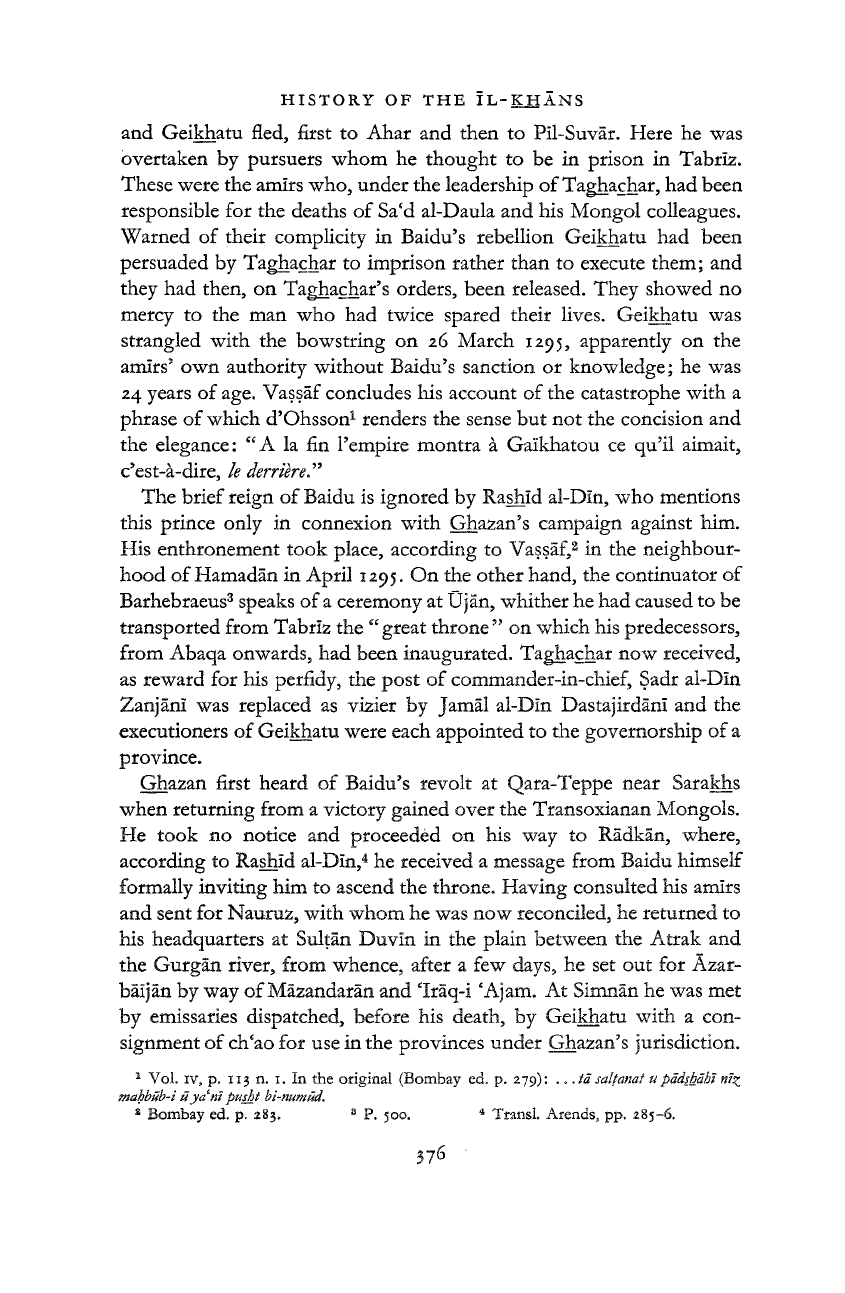
HISTORY OF THE ÏL-KHÂNS
576
•
and Geikhatu fled, first to Ahar and then to Pil-Suvăr. Here he was
overtaken by pursuers whom he thought to be in prison in Tabriz.
These were the amirs who, under the leadership of Taghachar, had been
responsible for the deaths of Sa'd al-Daula and his Mongol colleagues.
Warned of their complicity in Baidu's rebellion Geikhatu had been
persuaded by Taghachar to imprison rather than to execute them; and
they had then, on Taghachar's orders, been released. They showed no
mercy to the man who had twice spared their lives. Geikhatu was
strangled with the bowstring on 26 March
1295,
apparently on the
amirs' own authority without Baidu's sanction or knowledge ; he was
24
years of age. Vaşşăf concludes his account of the catastrophe with a
phrase of which d'Ohsson
1
renders the sense but not the concision and
the elegance
:
"A la fin l'empire montra à Gaïkhatou ce qu'il aimait,
c'est-à-dire, le derrière"
The brief reign of Baidu is ignored by Rashid al-Din, who mentions
this prince only in connexion with Ghazan's campaign against him.
His enthronement took place, according to
Vaşşăf,
2
in the neighbour-
hood of Hamadăn in April
1295.
On the other hand, the continuator of
Barhebraeus
3
speaks of a ceremony at
ÏJ j
an,
whither he had caused to be
transported from Tabriz the "great throne" on which his predecessors,
from Abaqa onwards, had been inaugurated. Taghachar now received,
as reward for his perfidy, the post of commander-in-chief, Şadr al-Din
Zanjăni was replaced as vizier by Jamăl al-Din Dastajirdăni and the
executioners of Geikhatu were each appointed to the governorship of a
province.
Ghazan first heard of Baidu's revolt at Qara-Teppe near Sarakhs
when returning from a victory gained over the Transoxianan Mongols.
He took no notice and proceeded on his way to Rădkăn, where,
according to Rashid al-Din,
4
he received a message from Baidu himself
formally inviting him to ascend the throne. Having consulted his amirs
and sent for Nauruz, with whom he was now reconciled, he returned to
his headquarters at Sultan Duvin in the plain between the Atrak and
the Gurgăn river, from whence, after a few days, he set out for Azar-
bâijăn by way of Măzandarăn and
c
Irăq-i 'Ajam. At Simnăn he was met
by emissaries dispatched, before his death, by Geikhatu with a con-
signment of ch'ao for use in the provinces under Ghazan's jurisdiction.
1
Vol. iv, p. 113 n. і. In the original (Bombay
ed.
p.
279):
.. Jăsultanat upădşhăhî
т%
mahbuh-i
йуа'гіїpuşht
bi-numud.
2
Bombay ed. p. 283.
8
P. 500.
4
Transi. Arends, pp.
285-6.
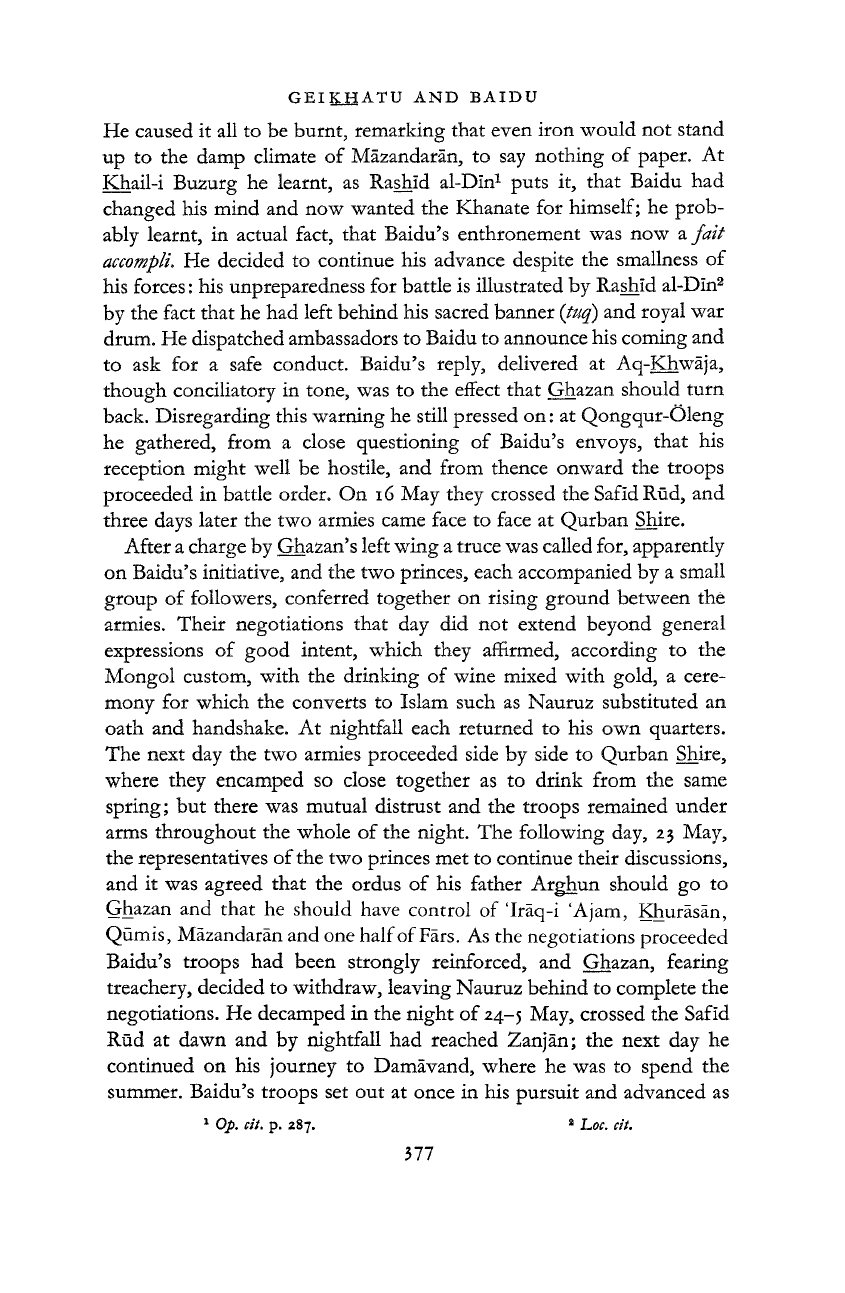
GEIKHATU AND BAIDU
377
He caused it all to be burnt, remarking that even iron would not stand
up to the damp climate of Mazandaran, to say nothing of paper. At
Khail-i Buzurg he learnt, as Rashid al-Din
1
puts it, that Baidu had
changed his mind and now wanted the Khanate for himself; he prob-
ably learnt, in actual fact, that Baidu's enthronement was now a fait
accompli.
He decided to continue his advance despite the smallness of
his forces: his unpreparedness for battle is illustrated by Rashid al-Din
2
by the fact that he had left behind his sacred banner (tuq) and royal war
drum. He dispatched ambassadors to Baidu to announce his coming and
to ask for a safe conduct. Baidu's reply, delivered at Aq-Khwaja,
though conciliatory in tone, was to the effect that Ghazan should turn
back. Disregarding this warning he still pressed on: at Qongqur-Oleng
he gathered, from a close questioning of Baidu's envoys, that his
reception might well be hostile, and from thence onward the troops
proceeded in battle order. On 16 May they crossed the Safid Rud, and
three days later the two armies came face to face at Qurban Shire.
After a charge by Ghazan's left wing a truce was called for, apparently
on Baidu's initiative, and the two princes, each accompanied by a small
group of followers, conferred together on rising ground between the
armies. Their negotiations that day did not extend beyond general
expressions of good intent, which they affirmed, according to the
Mongol custom, with the drinking of wine mixed with gold, a cere-
mony for which the converts to Islam such as Nauruz substituted an
oath and handshake. At nightfall each returned to his own quarters.
The next day the two armies proceeded side by side to Qurban Shire,
where they encamped so close together as to drink from the same
spring; but there was mutual distrust and the troops remained under
arms throughout the whole of the night. The following day, 23 May,
the representatives of the two princes met to continue their discussions,
and it was agreed that the ordus of his father Arghun should go to
Ghazan and that he should have control of 'Iraq-i A jam, Khurasan,
Qumis, Mazandaran and one half of Fars. As the negotiations proceeded
Baidu's troops had been strongly reinforced, and Ghazan, fearing
treachery, decided to withdraw, leaving Nauruz behind to complete the
negotiations. He decamped in the night of
24-5
May, crossed the Safid
Rud at dawn and by nightfall had reached Zanjan; the next day he
continued on his journey to Damavand, where he was to spend the
summer. Baidu's troops set out at once in his pursuit and advanced as
1
Op. cit. p. 287.
2
Loc. tit.
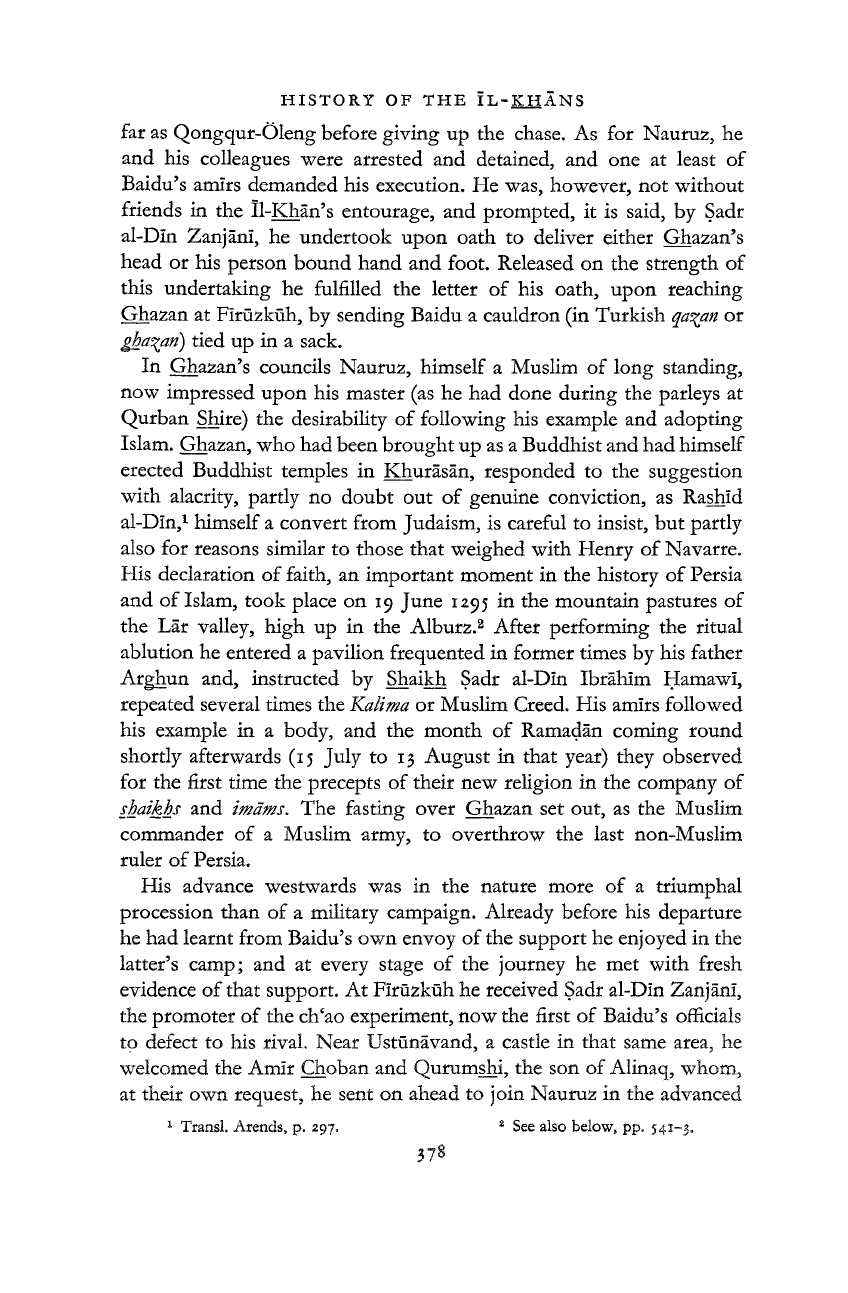
HISTORY OF THE IL-KHANS
far as Qongqur-Oleng before giving up the chase. As for Nauruz, he
and his colleagues were arrested and detained, and one at least of
Baidu's amirs demanded his execution. He was, however, not without
friends in the ll-Khan's entourage, and prompted, it is said, by Sadr
al-Din Zanjani, he undertook upon oath to deliver either Ghazan's
head or his person bound hand and foot. Released on the strength of
this undertaking he fulfilled the letter of his oath, upon reaching
Ghazan at Firuzkuh, by sending Baidu a cauldron (in Turkish qa^an or
ghazan) tied up in a sack.
In Ghazan's councils Nauruz, himself a Muslim of long standing,
now impressed upon his master (as he had done during the parleys at
Qurban Shire) the desirability of following his example and adopting
Islam. Ghazan, who had been brought up as a Buddhist and had himself
erected Buddhist temples in Khurasan, responded to the suggestion
with alacrity, partly no doubt out of genuine conviction, as Rashid
al-Din,
1
himself a convert from Judaism, is careful to insist, but partly
also for reasons similar to those that weighed with Henry of Navarre.
His declaration of faith, an important moment in the history of Persia
and of Islam, took place on 19 June
1295
in the mountain pastures of
the Lar valley, high up in the Alburz.
2
After performing the ritual
ablution he entered a pavilion frequented in former times by his father
Arghun and, instructed by Shaikh Sadr al-Din Ibrahim Hamawi,
repeated several times the Kalima or Muslim Creed. His amirs followed
his example in a body, and the month of Ramadan coming round
shortly afterwards
(15
July to 13 August in that year) they observed
for the first time the precepts of their new religion in the company of
shaikhs and
imams.
The fasting over Ghazan set out, as the Muslim
commander of a Muslim army, to overthrow the last non-Muslim
ruler of Persia.
His advance westwards was in the nature more of a triumphal
procession than of a military campaign. Already before his departure
he had learnt from Baidu's own envoy of the support he enjoyed in the
latter's camp; and at every stage of the journey he met with fresh
evidence of that support. At Firuzkuh he received Sadr al-Din Zanjani,
the promoter of the ch'ao experiment, now the first of Baidu's officials
to defect to his rival. Near Ustunavand, a castle in that same area, he
welcomed the Amir Choban and Qurumshi, the son of Alinaq, whom,
at their own request, he sent on ahead to join Nauruz in the advanced
1
Transl. Arends, p. 297.
2
See also below, pp. 541-3.
378
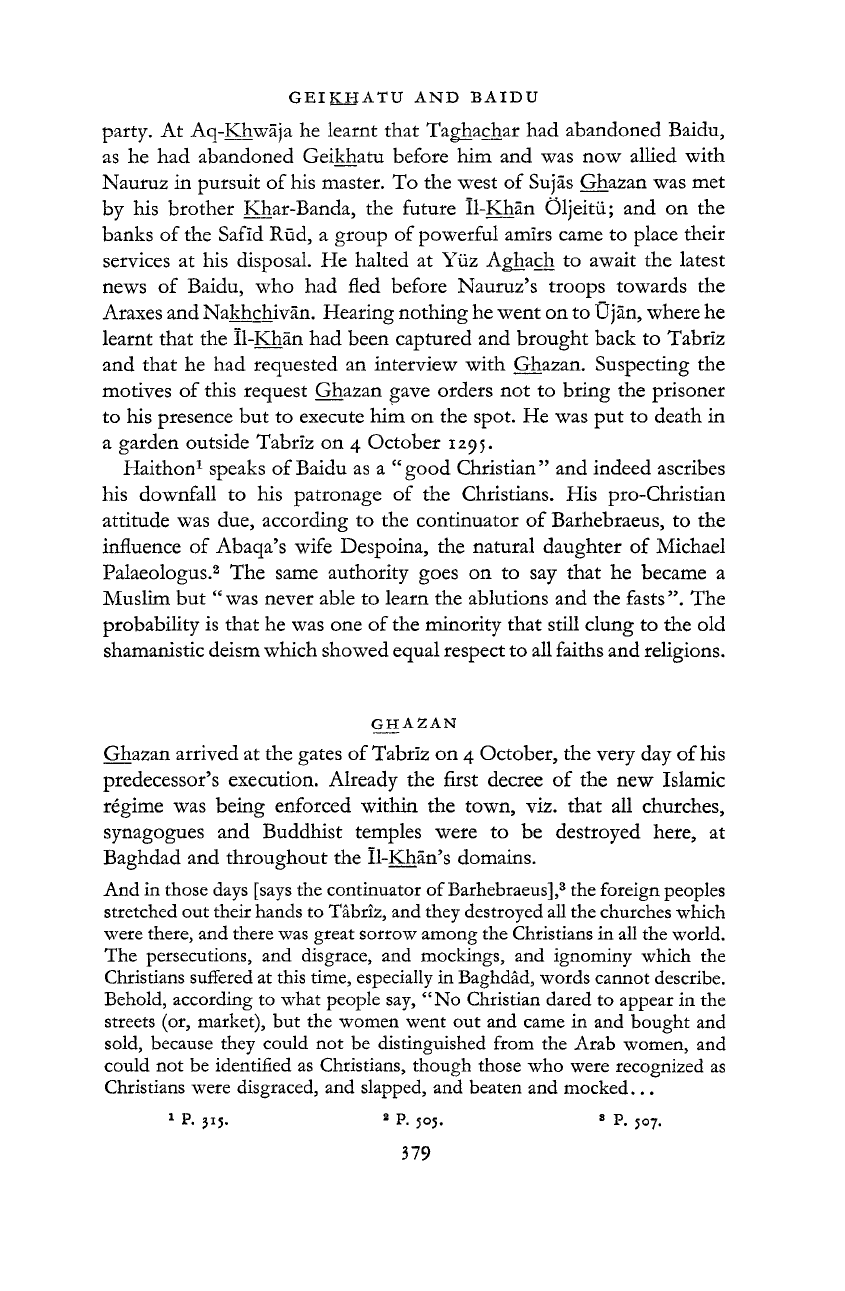
GEIKHATU AND BAIDU
379
party. At Aq-Khwâja he learnt that Taghachar had abandoned Baidu,
as he had abandoned Geikhatu before him and was now allied with
Nauruz in pursuit of his master. To the west of Sujâs Ghazan was met
by his brother Khar-Banda, the future Il-Khàn Oljeitii; and on the
banks of the Safïd Rùd, a group of powerful amirs came to place their
services at his disposal. He halted at Yuz A
ghach to await the latest
news of Baidu, who had fled before Nauruz's troops towards the
Araxes and Nakhchivan, Hearing nothing he went on to Ujan, where he
learnt that the Il-Khan had been captured and brought back to Tabriz
and that he had requested an interview with Ghazan. Suspecting the
motives of this request Ghazan gave orders not to bring the prisoner
to his presence but to execute him on the spot. He was put to death in
a garden outside Tabriz on 4 October
1295.
Haithon
1
speaks of Baidu as a " good Christian " and indeed ascribes
his downfall to his patronage of the Christians. His pro-Christian
attitude was due, according to the continuator of Barhebraeus, to the
influence of Abaqa's wife Despoina, the natural daughter of Michael
Palaeologus.
2
The same authority goes on to say that he became a
Muslim but "was never able to learn the ablutions and the fasts". The
probability is that he was one of the minority that still clung to the old
shamanistic deism which showed equal respect to all faiths and religions.
GHAZAN
Ghazan arrived at the gates of Tabriz on 4 October, the very day of his
predecessor's execution. Already the first decree of the new Islamic
régime was being enforced within the town, viz. that all churches,
synagogues and Buddhist temples were to be destroyed here, at
Baghdad and throughout the Il-Khân's domains.
And in those days [says the continuator of Barhebraeus],
3
the foreign peoples
stretched out their hands to Tabriz, and they destroyed all the churches which
were there, and there was great sorrow among the Christians in all the world.
The persecutions, and disgrace, and mockings, and ignominy which the
Christians suffered at this time, especially in Baghdad, words cannot describe.
Behold, according to what people say, "No Christian dared to appear in the
streets (or, market), but the women went out and came in and bought and
sold, because they could not be distinguished from the Arab women, and
could not be identified as Christians, though those who were recognized as
Christians were disgraced, and slapped, and beaten and mocked...
1
P. 315.
2
P. 505.
8
P. 507.
